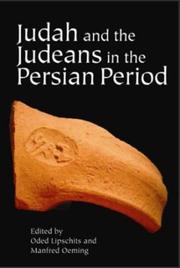| Listing 1 - 2 of 2 |
Sort by
|
Book

ISBN: 1575066211 9781575066219 1575061902 9781575061900 Year: 2021 Publisher: University Park, PA
Abstract | Keywords | Export | Availability | Bookmark
 Loading...
Loading...Choose an application
- Reference Manager
- EndNote
- RefWorks (Direct export to RefWorks)
Encountering an ancient text not only as a historical source but also as a literary artifact entails an important paradigm shift, which in recent years has taken place in classical and Oriental philology. Biblical scholars, Egyptologists, and classical philologists have been pioneers in supplementing traditional historical-critical exegesis with more-literary approaches. This has led to a wealth of new insights. While the methodological consequences of this shift have been discussed within each discipline, until recently there has not been an attempt to discuss its validity and methodology on an interdisciplinary level. In 2006, the Faculty of Bible and Biblical Interpretation at the Hochschule für Jüdische Studien, Heidelberg, and the Faculty of Theology at the University of Heidelberg invited scholars from the U.S., Canada, the Netherlands, Israel, and Germany to examine these issues. Under the title "Literary Fiction and the Construction of Identity in Ancient Literatures: Options and Limits of Modern Literary Approaches in the Exegesis of Ancient Texts," experts in Egyptology, classical philology, ancient Near Eastern studies, biblical studies, Jewish studies, literary studies, and comparative religion came together to present current research and debate open questions.At this conference, each representative (from a total of 23 different disciplines) dealt with literary theory in regard to his or her area of research. The present volume organizes 17 of the resulting essays along 5 thematic lines that show how similar issues are dealt with in different disciplines: (1) Thinking of Ancient Texts as Literature, (2) The Identity of Authors and Readers, (3) Fiction and Fact, (4) Rereading Biblical Poetry, and (5) Modeling the Future by Reconstructing the Past.


ISBN: 1575065614 9781575065618 157506104X 9781575061047 9781575061047 Year: 2021 Publisher: University Park, PA
Abstract | Keywords | Export | Availability | Bookmark
 Loading...
Loading...Choose an application
- Reference Manager
- EndNote
- RefWorks (Direct export to RefWorks)
In July 2003, a conference was held at the University of Heidelberg (Germany), focusing on the people and land of Judah during the 5th and early 4th centuries B.C.E.— the period when the Persian Empire held sway over the entire ancient Near East. This volume publishes the papers of the participants in the working group that attended the Heidelberg conference.Participants whose contributions appear here include: Y. Amit, B. Becking, J. Berquist, J. Blenkinsopp, M. Dandamayev, D. Edelman, T. Eskenazi, A. Fantalkin and O. Tal, L. Fried, L. Grabbe, S. Japhet, J. Kessler, E. A. Knauf, G. Knoppers, R. Kratz, A. Lemaire, O. Lipschits, H. Liss, M. Oeming, L. Pearce, F. Polak, B. Porten and A. Yardeni, E. Stern, D. Ussishkin, D. Vanderhooft, and J. Wright.The conference was the second of three meetings; the first, held at Tel Aviv in May 2001, was published as Judah and the Judeans in the Neo-Babylonian Period by Eisenbrauns in 2003. A third conference focusing on Judah and the Judeans in the Hellenistic era was held in the summer of 2005, at Münster, Germany, and will also be published by Eisenbrauns.
Jews --- Judaism --- Hebrews --- Israelites --- Jewish people --- Jewry --- Judaic people --- Judaists --- Ethnology --- Religious adherents --- Semites --- History --- Bible. --- Antico Testamento --- Hebrew Bible --- Hebrew Scriptures --- Kitve-ḳodesh --- Miḳra --- Old Testament --- Palaia Diathēkē --- Pentateuch, Prophets, and Hagiographa --- Sean-Tiomna --- Stary Testament --- Tanakh --- Tawrāt --- Torah, Neviʼim, Ketuvim --- Torah, Neviʼim u-Khetuvim --- Velho Testamento --- Criticism, interpretation, etc. --- Judaea (Region) --- Yehud (Persian province) --- Erets Yehudah (Region) --- Ereẓ Yehudah (Region) --- Judah, Land of (Region) --- Judea (Region) --- Land of Judah (Region) --- Yahūdhā (Region) --- Yehuda (Region)
| Listing 1 - 2 of 2 |
Sort by
|

 Search
Search Feedback
Feedback About UniCat
About UniCat  Help
Help News
News